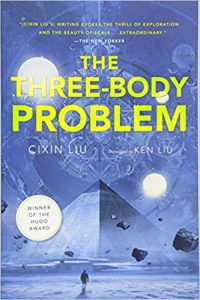Below you will find a list of books that members of the Geopolitical Futures team are currently reading. It highlights insightful and relevant books from around the globe and the reasons we chose them.
The Three-Body Problem
By Liu Cixin
In the 16th century, or maybe the 17th, I don’t really know, in a land that may or may not be Egypt, Sir Isaac Newton stabs a guy in the arm, then meets computer scientist John von Neumann and someone who goes by the name Copernicus but who is not, in fact, the famed astronomer, at the top of a pyramid. (Incidentally, Julius Caesar is alive too.)
Together, they input data into the … I guess you could call it a machine they had just assembled, a “computer” composed of tens of millions of Chinese soldiers lent to them by the first emperor of the Qin dynasty. The soldiers are equipped with black and white flags that they raise or lower, depending on the orders issued by the scientists, to simulate differential equations. Cavalrymen dispatch the orders. They ride up and down aisles carved among the phalanxes – a crude approximation of a circuit board – while off to the side scholars of eras past, recently brought back to life by a process called “rehydration,” which is exactly what it sounds like, record the data the human computer processes.
If the experiment fails, Newton, von Neumann and the man calling himself Copernicus will probably be boiled alive in a cauldron, but before they get the chance to fail, the stars literally align, sucking everyone up into their orbit and thus into a fiery death.
So transpires one of the more insane scenes in “The Three-Body Problem,” the first installment of Liu Cixin’s highly acclaimed trilogy, “Remembrance of Earth’s Past,” about humanity’s first contact with alien life. If the scene above sounds strange, that’s because it is, but it belies the gravity of the story, which is set against the backdrop of China’s Cultural Revolution. Liu expertly captures the tumult of the times, as well as the brutality of the counterrevolutions that followed. He captures them so well, in fact, that for the first few dozen pages you’d think you were reading a work of historical fiction, not science fiction. You are introduced to no black holes or wormholes or spaceships. Rather, you are treated to the public execution of a theoretical physicist – a “reactionary,” as so many academics were branded – who was not felled by a phaser or a light saber but was instead beaten to death in front of his wife and daughter with belt buckles wielded by former students.
His daughter, Ye Wenjie, is a budding astrophysicist in her own right whose career appears to end before it even begins. She, too, is labeled a reactionary and is sent away for re-education. Her destination is a forest in Inner Mongolia, far away from the dangers of modernity, save for a mysterious military base, perched atop a mountain and capped with a radio antenna, a place where Ye would eventually be recruited to work. Only later does she discover that the facility’s purpose is to search for extraterrestrial intelligence. Now, alien-hunting may seem like an unusual pursuit in the aftermath of a revolution, but the communists, having learned of the United States’ forays in the field, couldn’t bear the thought of Western imperialists as Earth’s sole emissaries to distant life. It follows, then, that the message they broadcast, polite though it may have been, was nonetheless a political enterprise meant to curry favor with whomever may find it, standing in stark contrast with, say, the Golden Records of the Voyager. The account of the process by which the message was drafted reveals a lot about the political climate at the time and thus the trepidation with which people operated within the Communist Party. It’s geopolitics on a cosmic scale.
The plot is nonlinear, spanning different timelines interspersed with vignettes of computer simulations, so there’s no use trying to trace it here. But things take an interesting turn in the third act. By this time, the Chinese had already contacted the aliens, and word of their contact had spread throughout the world. Factions begin to form as governments and secret societies learn that the aliens are on their way – and that they, we learn, intend to subjugate the human species. Some want to repel the invaders. Others, disillusioned with the moral entropy of human existence, want annihilation. These people are utterly polarized, loosely identified by the camp to which they belong, and though their experience in that regard is not an airtight allegory of the Chinese Civil War, or of the chaos that followed it, it’s difficult to ignore the parallels between the two, especially when characters such as Ye Wenjie are at the center of both.
“The Three-Body Problem” is a work of hard science fiction, a sub-genre that places an emphasis on scientific accuracy rather than on the social implications of scientific development. (Think of “The Martian,” not “Black Mirror.”) But the scientific aspects of the book come naturally to Liu Cixin, who is himself a former computer engineer. And he approaches them with a certain reverence, almost like a fan rather than a clinician, that brightens his writing and his story. It’s why he spends so much time invoking names like Leibniz and Galileo, even as he brings them back to life in bizarre and sometimes cartoonish ways. Even the book’s title expresses an appreciation of the classics. It refers to a quandary in orbital mechanics that seeks to answer the question: How do you chart the motion of three bodies in space according to the laws of Newtonian physics?
The result is an infective book that works on just about every level, a book that uses imagined scenarios to explore real issues like forgiveness, oppression, loneliness and redemption. It bridges the gap between good genre fiction and just good fiction.
Cole Altom, managing editor





 Special Collection – The Middle East
Special Collection – The Middle East